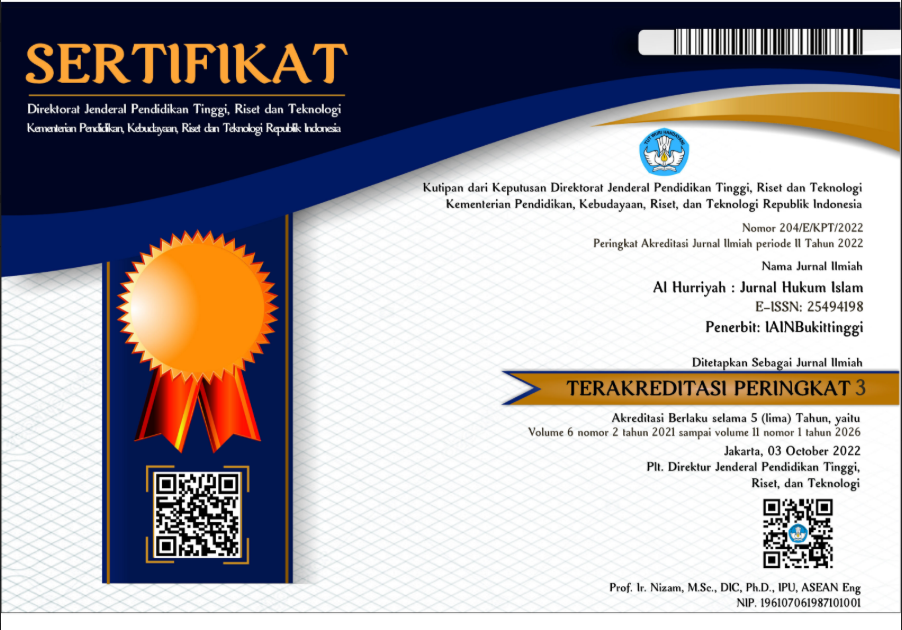Bitcoin as A Wedding Dowry : A Case of Marriage With A Dowry Whose Currency is Not Clear
DOI:
https://doi.org/10.30983/al%20hurriyah.v8i2.5683Keywords:
Dowry, Bitcoin, Wedding,Abstract
Wedding dowries are typically given as gifts or assets of a specified value, such as money, gold, real estate, houses, automobiles, or other commodities. Couples are now creating bitcoin as a wedding dowry, in keeping with the times. The use of bitcoin as a dowry in marriage raises an interesting issue because it cannot be regarded as an object because it lacks a physical form and cannot be regarded as legal tender because it is not issued by the appropriate government. A literature review was the approach employed in this investigation. This study found that there are two opinions on the permissibility of bitcoin as a dowry, firstly bitcoin should not be used as a dowry in a marriage because of the element of gharar in bitcoin. The second opinion is that bitcoin can be used as a wedding dowry because there is regulation by the government, but it is an asset or commodity like gold that can be traded, and this bitcoin has a useful value according to the legal terms of the dowry.
Mahar pernikahan pada umumnya berbentuk barang atau harta denominas itertentu, seperti uang tunai, emas, tanah, apartemen, mobil, atau barang berharga lainnya. Seiring dengan perkembangan zaman, terdapat pasangan yang menjadikan bitcoin sebagai mahar pernikahan. Bitcoin tidak dapat dikatakan sebagai barang karena tidak mempunyai bentuk fisik serta tidak bisa dikatakan sebagai uang yang sah karena tidak diterbitkan oleh otoritas yang berwenang, sehingga menjadi pertanyaan menarik terhadap penggunaan bitcoin sebagai mahar dalam pernikahan. Metode yang digunakan dalam penelitian ini adalah kajian pustaka. Penelitian ini menemukan bahwa ada dua pendapat kebolehan bitcoin sebagai mahar, pertama bitcoin tidak boleh digunakan sebagai mahar dalam pernikahan karena adanya unsurg harar dalam bitcoin. Pendapat kedua, bitcoin ini boleh digunakan sebagai mahar pernikahan karena sudah ada regulasi oleh pemerintah, namun sebagai aset atau komoditi layaknya emas yang dapat diperdagangkan, dan bitcoin ini memiliki nilai manfaat sesuai dengan syarat sah mahar.
References
Arahman, Rudi, and Siti Lamusiah. “Transaksi Yang Mengandung Unsur Riba, Maysir, Dan Gharar Dalam Kajian Tindak Tutur.†Jurnal Ilmiah Telaah 5, no. 2 (2020): 28–35.
Danella, Tiara Dhana. “Bitcoin Sebagai Alat Pembayaran Yang Legal Dalam Transaksi Online.†PhD Thesis, Brawijaya University, 2015.
Guirkinger, Catherine, Jérémie Gross, and Jean-Philippe Platteau. “Are Women Emancipating? Evidence from Marriage, Divorce and Remarriage in Rural Northern Burkina Faso☆.†World Development 146 (October 1, 2021): 105512. https://doi.org/10.1016/j.worlddev.2021.105512.
Hadi, Mukhammad Nur. “Mahar Produktif Dalam Penalaran Ta’lili.†Qolamuna: Jurnal Studi Islam 4, no. 2 (2019): 171–94.
Hosen, Nadratuzzaman. “Analisis Bentuk Gharar Dalam Transaksi Ekonomi,†2009.
Ilyasa, Raden Muhammad Arvy. “Legalitas Bitcoin Dalam Transaksi Bisnis Di Indonesia.†Lex Scientia Law Review 3, no. 2 (2019): 115–28.
Miko, Boby Juliansjah Megah. “Konsepsi Hukum Mahar Cryptocurrency Dalam Perkawinan.†Jurnal Ilmiah Universitas Batanghari Jambi 22, no. 1 (2022): 126–31.
Muchtar, Evan Hamzah. “Muamalah Terlarang: Maysir Dan Gharar.†Jurnal Asy-Syukriyyah 18, no. 1 (2017): 82–100.
Mulyanto, Ferry. “Pemanfaatan Cryptocurrency Sebagai Penerapan Mata Uang Rupiah Kedalam Bentuk Digital Menggunakan Teknologi Bitcoin.†Indonesian Journal on Networking and Security 4, no. 4 (2015): 2302–5700.
Musarrofa, Ita. “Dowry Trends in the Digital Age (Sociology of Law Review of the Use of Digital Dowry in the Cyber World Community).†JURNAL HUKUM ISLAM 19, no. 1 (2021): 151–74.
Nababan, Keisya Naomi Natalia. “Tinjauan Legalitas Transaksi Bitcoin Di Indonesia.†Jurist-Diction 2, no. 5 (2019): 1745–64.
Nur, Efa Rodiah. “Riba Dan Gharar: Suatu Tinjauan Hukum Dan Etika Dalam Transaksi Bisnis Modern.†Al-’Adalah 12, no. 1 (2015): 647–62.
Prasetio, Dika. “Mahar Perkawinan Dengan Uang Elektronik Dalam Perspektif Hukum Islam.†PhD Thesis, UIN SMH BANTEN, 2022.
Putra, Firman Surya. “Urgensi Dan Kedudukan Shodaq (Mahar) Dalam Pernikahan.†Jurnal An-Nahl 8, no. 2 (2021): 78–90.
Rahman, Muh Fudhail. “Hakekat Dan Batasan-Batasan Gharar Dalam Transaksi Maliyah.†SALAM; Jurnal Sosial & Budaya Syar-I 5, no. 3 (2018): 255–78.
Ramadhana, Syahrin. “BITCOIN SEBAGAI MAHAR PERNIKAHAN MENURUT PANDANGAN ULAMA KOTA BANJARMASIN,†2022.
Singh, Ashish, Abhinav Kumar, and Zahid Akhtar. “Bitcoin Price Prediction: A Deep Learning Approach.†In 2021 8th International Conference on Signal Processing and Integrated Networks (SPIN), 1053–58. IEEE, 2021.
Syahputra, Angga, and Yoesrizal M. Yoesoef. “Praktek Gharar Pada Endorsement Produk Di Media Sosial Instagram.†Al-Mustashfa: Jurnal Penelitian Hukum Ekonomi Syariah 5, no. 2 (2020): 117–26.
Downloads
Published
How to Cite
Issue
Section
Citation Check
License
Copyright (c) 2023 Yusna Zaidah,Syahrin Ramadhan, Anwar Hafidzi

This work is licensed under a Creative Commons Attribution-ShareAlike 4.0 International License.
Authors who publish with this journal agree to the following terms:
- Authors retain copyright and grant the journal right of first publication with the work simultaneously licensed under a Creative Commons Attribution-ShareAlike 4.0 International License that allows others to share the work with an acknowledgment of the work's authorship and initial publication in this journal.
- Authors are able to enter into separate, additional contractual arrangements for the non-exclusive distribution of the journal's published version of the work (e.g., post it to an institutional repository or publish it in a book), with an acknowledgment of its initial publication in this journal.
- Authors are permitted and encouraged to post their work online (e.g., in institutional repositories or on their website) prior to and during the submission process, as it can lead to productive exchanges, as well as earlier and greater citation of published work (See The Effect of Open Access).





